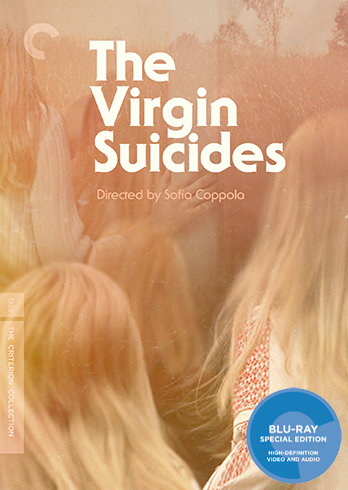Soundtracking: "The Virgin Suicides"
 Wednesday, April 25, 2018 at 10:00AM
Wednesday, April 25, 2018 at 10:00AM Chris looks at the music of Sofia Coppola's debut, now a part of The Criterion Collection.
 Time has been kind to Sofia Coppola The Virgin Suicides, as effective a critique on the male gaze as anything else in the past twenty years. In Coppola’s gauzy vision of its central Lisbon sisters (as told by neighborhood boys) is a reflection of male idolatry that ignores the voice and emotional reality of real women. While the film is typically remembered for how it visually creates this perspective, it also uses music in interesting ways to subvert male self-serving worship.
Time has been kind to Sofia Coppola The Virgin Suicides, as effective a critique on the male gaze as anything else in the past twenty years. In Coppola’s gauzy vision of its central Lisbon sisters (as told by neighborhood boys) is a reflection of male idolatry that ignores the voice and emotional reality of real women. While the film is typically remembered for how it visually creates this perspective, it also uses music in interesting ways to subvert male self-serving worship.
The film is haunted by Air’s “Playground Love”, it’s most evocative and film-defining musical passage. It’s an apt song choice, one that tempts you into its pull like the tumble into a teenage crush, all jazzy hormones mired in lyrical thinness. And yet despite its temptation and seemingly feminine sway, its a starkly male brand of lust and the woman on the other end of its proclamations is never more than a vague idea. Naturally, it becomes the theme song to its young male obsession with the unknowable and unknown girls on the receiving end of empty crushes. Coppola sees and hears your horniness and you willful ignorance, gentlemen, and the film sends out a subtle and cutting middle finger.
Even when the film does engage female lust, it comes through the lens of male awe. Compared to the breathless and ever so porny smokiness of “Playground Love”, Heart’s “Magic Man” blazes through with a contrasting feminine feverishness, a palpable (and unpretentious) defiance in its horniness as it introduces stud Trip Fontaine. The band’s “Crazy on You” will later christen Trip and Lux’s car makeout session, but this track is a definitive on several fronts: for Trip himself, the lust showered on him, and by extension the envy of his male classmates.
At once, we are audibly served something that stands in stark contrast to the male lust of “Playground Love” but also presents an insatiable, unfettered carnality they want to see from women. Here, a female sound is deceptive. In Heart’s sweaty pink glow, Trip is the cliche of “women want him, men want to be him”, a hero to the boys for what he does to women. And yet, that is as much a projection onto the manipulative Trip as the goddess “Playground” image is upon the Lisbon sisters. His “Magic” is reckless and with a more fumbling prowess than the image the song casts over him.
This musical disconnect is brought front and center in a brief sequence where the neighborhood boys engage in a vinyl dialogue with the Lisbons. This youthful expression of affection is all too real, a relatable and innocent moment but without the undercurrent of pain the rest of the film carries. This age is when music can express what we cannot, the magnitude of the melody matching the tidal wave of emotion inside us and the world wiseness we think we possess. In a song, we think we recognize the object of our affection and ourselves.
And yet the spiritual exhale that results in these naive men reveals how they pick up all the wrong messages from the songs chosen by the girls. The trap of pasting a long song on onto our lives in youth is that we can easily ignore the pieces that don’t apply to us or our perfect idea of our situation, exactly as the boys do here. While they communicate with songs of soaring adoration (literal sweet nothings), the Lisbons respond with tracks of isolation and loneliness. Even in playing Gilbert O’Sullivan and Carole King for their happenstance audience, the boys choose subconsciously the message they wish to receive. It massages their need to be desired by the Lisbons and also inflates the wounded porcelain image they have of them - but wholeheartedly ignores the girls’ real human need to be heard as they actually are on the other end of the phone, so very far away.
All Soundtracking installments can be found here!



Reader Comments (3)
Definitely one of my favorite films ever and one of the reasons why I love, love, love Sofia more than any other filmmaker. Her approach to music in film is just incredible as I love that phone call montage as the choice of music is just incredible. Gilbert O'Sullivan, Todd Rundgren, the Bee Gees, Carole King. She captured a period in time that is just magical as it was really the starting point of things to come in which she would make THE BEST FILM EVER (LiT) and other great films.
I'm very mainstream so I never heard of Air before this movie (Sophia's best, if you ask me).
Sofia's best film in my opinion. Many people pay attention to the music, actors or the picture, but the problem of suicide that is raised in the film is very important to me. When I was in college, we studied this topic in the literature, and on https://sunnypapers.com/paper-samples/suicide/ I was able to find research papers that helped me write my own essay. As an extracurricular activity, I decided to pay attention to this film, and I am still impressed. I recommend.